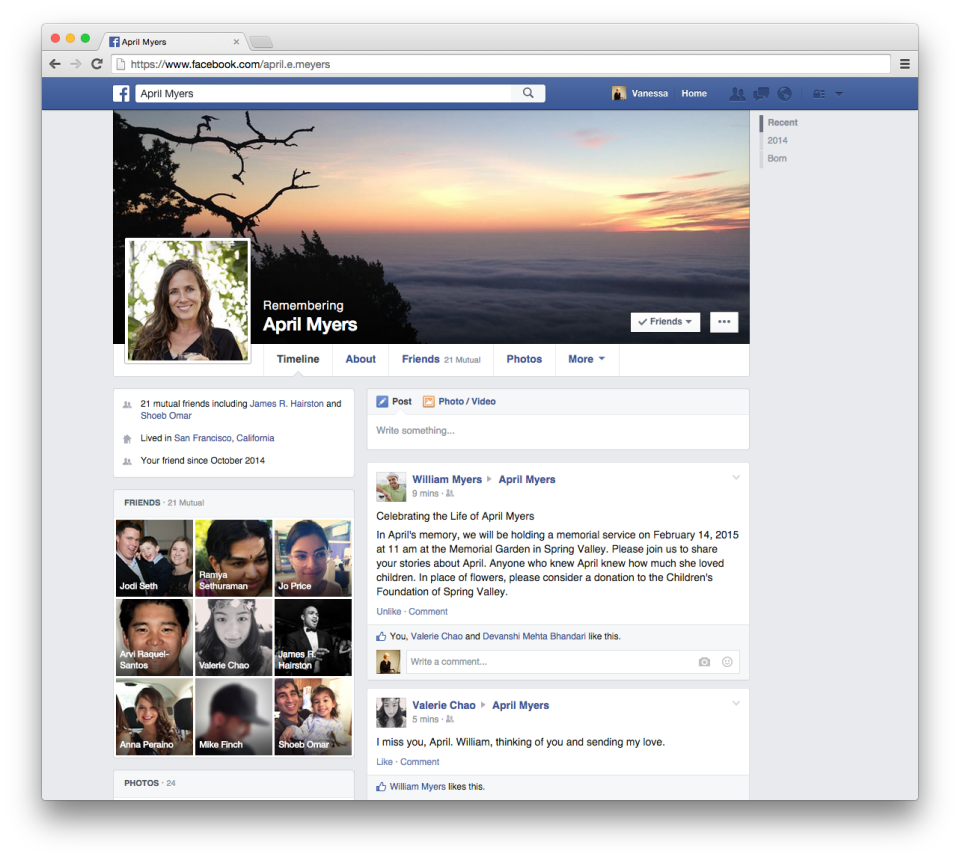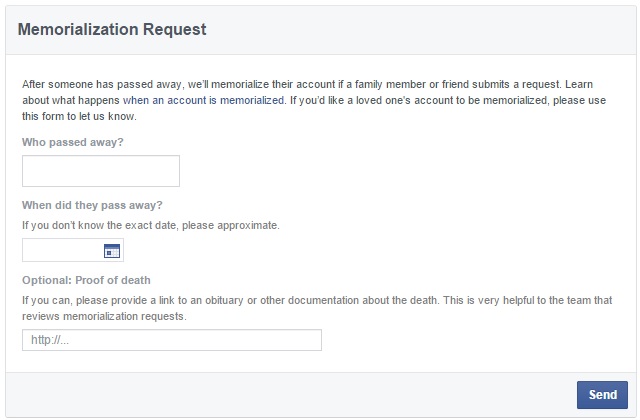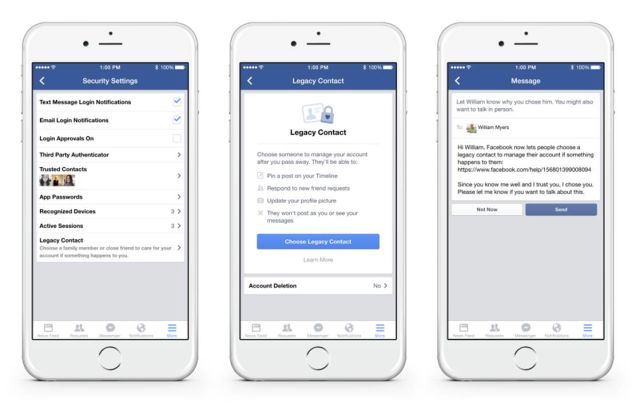Facebook’s Transparency Report for the latter half of 2014 shows slightly fewer U.S. government requests for user data; the company also updates its Community Standards.
Tag Archives: Facebook
Facebook Issues Present Possible Threat to Users
A security researcher has identified a pair of security issues in Facebook, one of which can be used to to upload an arbitrary file to the site, and the other of which can allow an attacker to gain control of a victim’s machine under some limited circumstances with user interaction. The more serious of the vulnerabilities, which […]
What happens to my Facebook account when I die?

Photos, videos, status updates… Social networking sites store lots of information about you. Just take a look at your Facebook page’s wall. What do you see? Birthday pictures, your ‘Year in Review’ video, and hundreds of other things that give an idea of your life. What will happen to all these things when you’re gone?
If you are worried about what will happen to your digital life when you are dead, you’ll be happy to learn that Facebook has decided to grant users more control over how their online identities will be handled after death. The social network now lets users give someone they trust the keys to their profile page in case they die.
Until now, when someone passed away, Facebook turned the deceased person’s account into a memorialized account, for friends and family to share and celebrate the memories of their loved one. For this to be possible, a user had to report the deceased person or the account that needed to be memorialized through a link.

Now, Facebook goes one step further and lets users appoint an heir for their accounts. The new feature, called “Legacy Contact“, allows users to choose someone from their contacts to manage their account after they pass away.
This feature allows the Legacy Contact to write a memorial post on their friend’s profile page, respond to new friend requests, and change the friend’s profile picture. However, they won’t be able to access certain confidential information such as private messages.

As published by Facebook on its blog, the ‘Legacy Contact’ feature is available only in the United States for now, although it will roll out to other countries soon.
How to choose a ‘Legacy Contact’ on Facebook
Now, how do you choose a ‘Legacy Contact’? The steps to take are really simple:
- Go to ‘Settings’
- Select ‘Security’
- Choose ‘Legacy Contact’. There, select the person who will manage your memorialized account and specify the actions that they will be able to take.
- Finally, send them a message to let them know you have selected them as your digital heir

In any case, Facebook also gives you the chance to take more drastic measures: you can choose to have your account permanently shut down when you die.
Until the time arrives when this new feature is implemented in your country, it is time for you to think: who will you entrust with the task of managing your account?
The post What happens to my Facebook account when I die? appeared first on MediaCenter Panda Security.
Facebook rewards ‘white hat’ hackers with $1.3m bounty
Facebook has announced that it paid out $1.3 million last year to ‘white hat’ hackers, as part of a bounty initiative that rewards developers for spotting flaws in the social network.
The post Facebook rewards ‘white hat’ hackers with $1.3m bounty appeared first on We Live Security.
Facebook Bug Bounty Submissions Climb in 2014
Facebook released final numbers on 2014 submissions and payouts from its bug bounty program, showing continued growth in both areas.
Komodia Website Under DDoS Attack
Komodia.com, home of the SSL module at the heart of the Superfish scandal, is offline because of a DDoS attack.
Legacy Contacts and managing a Digital Legacy
Emails, photos, random postings… We all have a digital footprint and depending on your privacy settings, it’s available to many people including strangers. Not to mention our passwords to accounts, and other digital assets, including financial ones. Who can access them when we pass on? What happens to the data?
In the world of Internet services, digital legacies and the policies around them have been murky at best.
Because of our position as a leading provider of security for data, devices and people this is an issue we at AVG have long been concerned about. And that’s why we’ve been focused on educating our users on this sensitive topic and advocating for people to provide a digital codicil to their wills, specifying a digital executor to act on their behalf. (You can see our most recent article here. We also published an ebook dealing with digital death.
Today, different sites have different policies, and requirements vary on the actions that can be taken, and the forms of identification and proof that are required in case of a user’s death. Twitter has a policy to deactivate accounts after six months of prolonged inactivity, but also will work with authorized individuals to delete a deceased user’s account and or certain imagery. Until last week, Facebook’s policy was to allow users to specify if they wanted to “memorialize” or permanently delete their accounts. Last Thursday, Facebook moved to a step further to allow account holders to appoint what it calls a “Legacy Contact” to manage their memorialized accounts.

You can read the full announcement here that Facebook released Feb. 12.
But briefly: Facebook now allows the appointee to write a post for your profile, and update your profile picture and cover photo. It also allows the appointee to respond to new friend requests, for example a friend who hadn’t been on Facebook at the time of the user’s death. The Facebook executor, however, can’t go back and delete material, log into the account or remove any of your friends.
In its statement, Facebook said: “By talking to people who have experienced loss, we realized there is more we can do to support those who are grieving and those who want a say in what happens to their account after death.”
The Facebook move is good news, in many ways, not the least of which is that it helps bring this important issue of Digital Legacy to the forefront in one of the largest social venues, where many of us are living our digital lives. It also recognizes that users need more control of their accounts, including deciding how they want them managed when they pass.
Digital legacy is something that everyone online needs to consider. No one wants to consider their own death, but as the physical world morphs into the digital, it’s a very important part of our legacies. One we shouldn’t ignore.
Threatpost News Wrap, February 13, 2015
Dennis Fisher and Mike Mimoso discuss Patch Tuesday, the Facebook ThreatExchange platform, Mozilla’s extension signing plan, plus questions from readers!
Facebook exploit allowed attackers to remotely delete photos
A Facebook hack that allowed attackers to remotely delete any photo they wanted to from the social network has been patched by the company.
The post Facebook exploit allowed attackers to remotely delete photos appeared first on We Live Security.
Facebook launches ThreatExchange for companies to share security threats
Facebook has officially launched ThreatExchange – a collaborative social network where companies can share information on cybersecurity threats, in an effort to neuter potential damage.
The post Facebook launches ThreatExchange for companies to share security threats appeared first on We Live Security.
